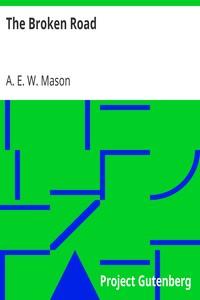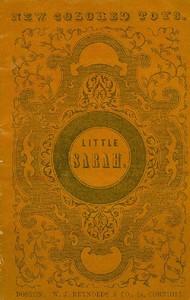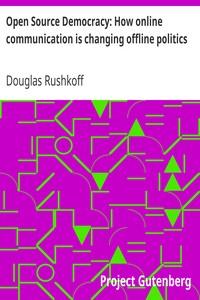|
|
Read this ebook for free! No credit card needed, absolutely nothing to pay.Words: 98730 in 49 pages
This is an ebook sharing website. You can read the uploaded ebooks for free here. No credit cards needed, nothing to pay. If you want to own a digital copy of the ebook, or want to read offline with your favorite ebook-reader, then you can choose to buy and download the ebook.

: The Broken Road by Mason A E W Alfred Edward Woodley - Imperialism Fiction; India History British occupation 1765-1947 Fiction; British India Fiction; India Social conditions 19th century Fiction; India Social conditions 20th century Fiction; India Race re@FreeBooksTue 06 Jun, 2023 CHAPTER THE BREAKING OF THE ROAD Then suddenly from Peshawur the wires began to flash their quiet and ominous messages. The road had been cut behind Linforth and his coolies. No news had come from him. No supplies could reach him. Luffe, who was in the country to the east of Chiltistan, had been informed. He had gathered together what troops he could lay his hands on and had already started over the eastern passes to Linforth's relief. But it was believed that the whole province of Chiltistan had risen. Moreover it was winter-time and the passes were deep in snow. The news was telegraphed to England. Comfortable gentlemen read it in their first-class carriages as they travelled to the City and murmured to each other commonplaces about the price of empire. And in a house at the foot of the Sussex Downs Linforth's young wife leaned over the cot of her child with the tears streaming from her eyes, and thought of the road with no less horror than the people of Chiltistan. Meanwhile the great men in Calcutta began to mobilise a field force at Nowshera, and all official India said uneasily, "Thank Heaven, Luffe's on the spot." Charles Luffe had long since abandoned the army for the political service, and, indeed, he was fast approaching the time-limit of his career. He was a man of breadth and height, but rather heavy and dull of feature, with a worn face and a bald forehead. He had made enemies, and still made them, for he had not the art of suffering fools gladly; and, on the other hand, he made no friends. He had no sense of humour and no general information. He was, therefore, of no assistance at a dinner-party, but when there was trouble upon the Frontier, or beyond it, he was usually found to be the chief agent in the settlement. Luffe alone had foreseen and given warning of the danger. Even Linforth, who was actually superintending the making of the road, had been kept in ignorance. At times, indeed, some spokesman from among the merchants of Kohara, the city of Chiltistan where year by year the caravans from Central Asia met the caravans from Central India, would come to his tent and expostulate. "We are better without the road, your Excellency. Will you kindly stop it!" the merchant would say; and Linforth would then proceed to demonstrate how extremely valuable to the people of Chiltistan a better road would be: "Kohara is already a great mart. In your bazaars at summer-time you see traders from Turkestan and Tibet and Siberia, mingling with the Hindoo merchants from Delhi and Lahore. The road will bring you still more trade." The spokesman went back to the broad street of Kohara seemingly well content, and inch by inch the road crept nearer to the capital. But Luffe was better acquainted with the Chiltis, a soft-spoken race of men, with musical, smooth voices and polite and pretty ways. But treachery was a point of honour with them and cold-blooded cruelty a habit. There was one particular story which Luffe was accustomed to tell as illustrative of the Chilti character. "There was a young man who lived with his mother in a little hamlet close to Kohara. His mother continually urged him to marry, but for a long while he would not. He did not wish to marry. Finally, however, he fell in love with a pretty girl, made her his wife, and brought her home, to his mother's delight. But the mother's delight lasted for just five days. She began to complain, she began to quarrel; the young wife replied, and the din of their voices greatly distressed the young man, besides making him an object of ridicule to his neighbours. One evening, in a fit of passion, both women said they would stand it no longer. They ran out of the house and up the hillside, but as there was only one path they ran away together, quarrelling as they went. Then the young Chilti rose, followed them, caught them up, tied them in turn hand and foot, laid them side by side on a slab of stone, and quietly cut their throats. "'Women talk too much,' he said, as he came back to a house unfamiliarly quiet. 'One had really to put a stop to it.'" Knowing this and many similar stories, Luffe had been for some while on the alert. Whispers reached him of dangerous talk in the bazaars of Kohara, Peshawur, and even of Benares in India proper. He heard of the growing power of the old Mullah by the river-bank. He was aware of the accusations against the ruling Khan. He knew that after night had fallen Wafadar Nazim, the Khan's uncle, a restless, ambitious, disloyal man, crept down to the river-bank and held converse with the priest. Thus he was ready so far as he could be ready. Free books android app tbrJar TBR JAR Read Free books online gutenberg More posts by @FreeBooks
: Little Sarah by Unknown - Wit and humor Juvenile; Grandmothers Juvenile poetry; Nonsense verses American Children's Picture Books@FreeBooksTue 06 Jun, 2023

: Open Source Democracy: How online communication is changing offline politics by Rushkoff Douglas - Democracy; Information society; Information society Political aspects; Information technology Political aspects; Political participation@FreeBooksTue 06 Jun, 2023
|
Terms of Use Stock Market News! © gutenberg.org.in2025 All Rights reserved.






